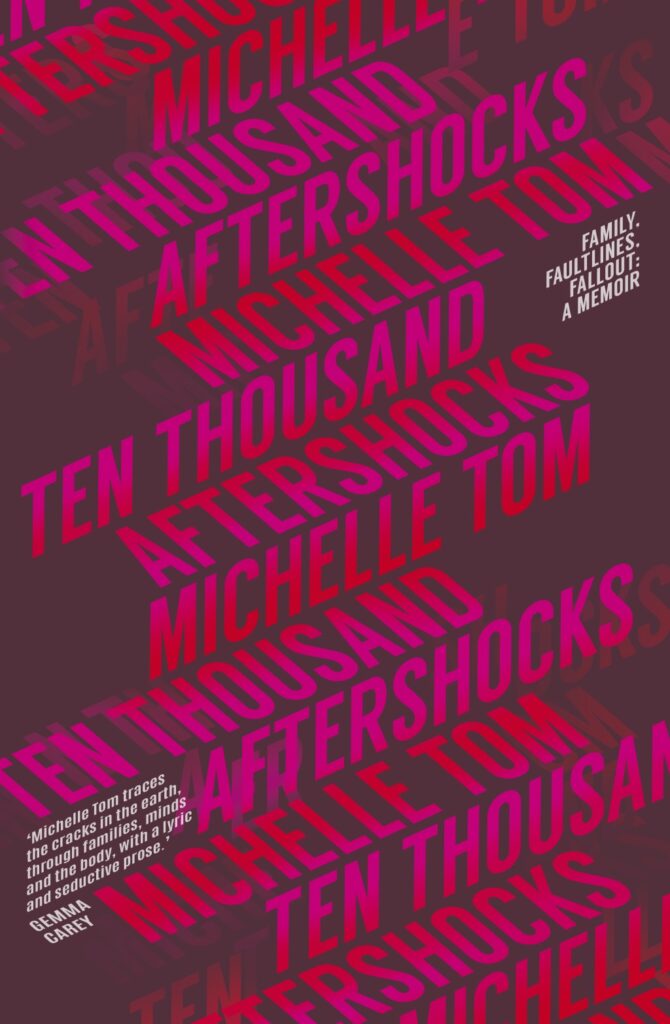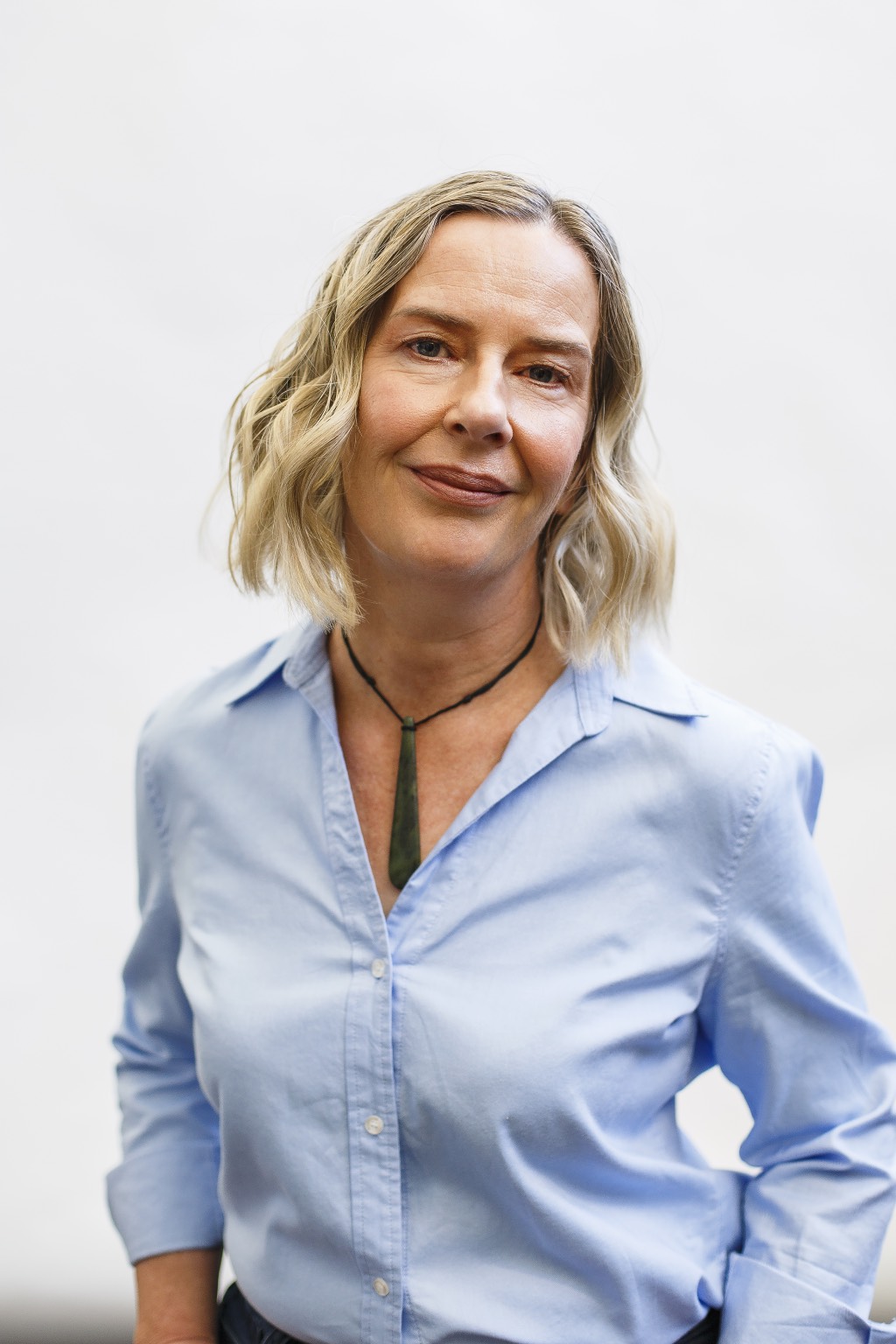It is a great pleasure to have the lovely Michelle Tom for our ‘Behind the Book’ segment. Michelle grew up in New Zealand. After losing her grounds and surviving the tragic experiences of the Christchurch earthquakes in 2011, she relocated with her family to the stability of Melbourne, Australia. Ten Thousand Aftershocks is her debut memoir.
How did you finalise the title Ten Thousand Aftershocks? Did you write the book first or the title?
Michelle- As I wrote the chapter that noted we had lived through ‘ten thousand aftershocks’–it’s quite late in the manuscript from memory– it struck me that it was the perfect title. I was writing about the unpitying nature of consequences and literal aftershocks, and the title also represented, for me, the breaking point we reached in Christchurch before leaving, as well as the vast and numerous repercussions of dysfunction in my family of origin.
What was the defining moment when you felt Ten Thousand Aftershocks must be written?
Michelle- It was as I stood at my sister’s grave. There had been so much loss, and I think I knew I would need to write about it to understand it.
You re-established yourself in Australia after surviving the series of earthquakes. Do you want to talk about the initial challenges that you might have faced along the way?
Michelle- I was not in a good way when I arrived on Australian shores. I was depressed and anxious and jumped at every loud noise. I had one friend in Melbourne, but we rarely saw each other because she lived in Brunswick, and I was in the southeast. Thankfully I met Anne, another Kiwi, through my sons’ school. I remember a week after the boys started school, my older son was due to go on a school camp, and I had no idea what I was doing. Anne quietly left a bag of her son’s old clothes and shoes on our doorstep and texted to tell me it was there. She didn’t want me to feel self-conscious about accepting the donation, but she knew the camp involved a mud run and suspected I didn’t have much in the way of old clothes to give my son to wear because our belongings were still on a ship in the Tasman Sea. Small acts of thoughtfulness like that meant so much to me.
A few months later, when my sister died, I went to school one morning, and a large group of mothers had already heard the news. I was embraced by each woman in turn, and it was wonderful to be pulled close at such a hard time.
I struggled with a lack of direction and PTSD for a long time, but I also appreciated the opportunity to live in a land that didn’t shake, so I went to a few meet-ups, joined a walking group and found a writing group. Slowly my social circle expanded, and now, nine years later, I have a wider community than I ever enjoyed in New Zealand. Looking back, I can see how important it was to keep trying. If one group didn’t work for me, I had to be persistent and continue to put myself out there, as hard as that was.
How did you start afresh with your professional journey in Australia?
Michelle- I don’t know what possessed me, really, but the first thing I did was a level 4 bookkeeping course. I had my own businesses in New Zealand, but the accounting side of things always made me sweat. Just the sound of my accountant’s voice on the phone would make my heart race. I’m not sure if I was emboldened by my earthquake journey, but I decided I no longer wanted to feel that way about my accounts. I passed the course and conquered my fear, but also realised that it wasn’t for me long term.
Later, I completed a re-training for industry floristry course, and enjoy helping friends from that course with big events when they need an extra pair of hands. The creativity of working with flowers is wonderful, but it is a much more physical job than most people think. Writing has become my job since then, and I’m happy to keep floristry as a sideline.
What kept you motivated on some not-so-great days?
Michelle- I am a relentlessly persistent person, but I think it’s a wise woman who knows when to rest. Also, therapy.
Your book touches on the scare of bushfires. How hard was it to acknowledge the challenges of another country’s climatic disorder at the time when you were already recovering from the aftershocks of one country?
Michelle- Ironic, right? Honestly, I think I was irritated at first. I fled to find safety, but the danger is everywhere, and I’ve come to accept that. I do most of my hiking in autumn and spring. I’ll even walk in the rain, but I am careful about where I venture in the warmer months.
Ultimately, I can avoid fires in Australia, but I couldn’t avoid quakes if I had stayed in New Zealand.
You’ve been living Down Under for nine years. What do you love the most about your life here?
Michelle- Pre-Covid, I loved that there was always something on or place to go. The outdoor opportunities in Victoria provide an embarrassment of riches, and discovering these gems is one of my greatest joys.
Second to exploring, I have to say that the opportunities here are more than I expected. I don’t think I would have been able to publish my memoir had I still been living in New Zealand. I’m also excited about the opportunities Australia offers my children.
How many re-edits did you have to go through for Ten Thousand Aftershocks?
Michelle- I tend to edit heavily as I write, re-reading yesterday’s work and re-working it before I start on the days’ new words, for example. When the manuscript was being prepared for publication, it went through a structural edit, which saw a few chapters deleted and replaced with new material, then a couple of rounds of copy edits and a proofread.
What drew your attention to the world of writing?
Michelle- I was drawn into writing by journalism, ostensibly so I could make a living by writing. I loved working in newspapers, especially in small communities–there was a sense that I was in on the backstory or undercurrent. I missed it later when I left to start a family, and it took a while for my news writing sensibilities to wear off so I could write creatively again.
What has been your biggest takeaway from this whole migrating process?
Michelle- That where you grow up has a huge bearing on the person you become. I feel formed by my country, and I see how my friends in Australia have been formed by their upbringing here. By acknowledging and honouring our differences, we learn from each other, and that makes us all richer.
Looking back, would you say this was the best decision to make this country your new home? Are you content, happy today?
Michelle- It wasn’t easy to leave a country when I felt as if I was being forced out by trauma, but yes, it was definitely the best decision to move to Australia. It has been our safe place in which to heal. I’m extremely grateful to this country and acknowledge the Aboriginal owners of this land and how my being here is an extension of colonialism, that this land was never ceded.
I do feel content and happy here, but I look back on New Zealand like I might an old boyfriend; I will always wish it had been different, that I might have been able to stay.
If you could, would you change anything in your journey from start to now?
Michelle- Honestly, no. We all do our best with what we have at the time, and I feel that while I didn’t get things right every time, I am okay with where I have arrived.
What is your best memory in Australia? A particular day, you see yourself telling your grandchildren about.
Michelle- My husband and I took a trail on the coast a few years ago. We ended up on a huge flat section of rock at the ocean’s edge. A storm was rolling in, and waves crashed against the underside of this platform where we stood as spray exploded overhead. We were safely back from the edge, but my husband grew up in the city, and his face was a picture of excitement and delight as he waited to see if the next wave would be the biggest of them all. He still talks about that day, and we wonder if we can remember how to get back to that big flat rock and if the ocean will be big enough to crash around us like it did that day.

Michelle Tom’s memoir Ten Thousand Aftershocks is published by 4th Estate and is available now at all good bookstores and online.
Read our book review for Ten Thousand Aftershocks here.
